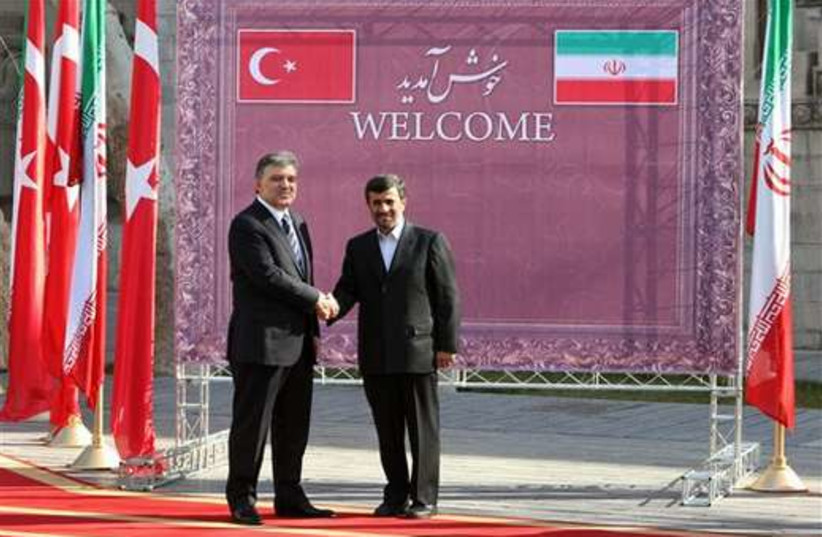SETH J. FRANTZMAN
Regimes based in Turkey and Iran both sought to exploit and support violent protests in the US over the weekend for the killing of George Floyd by a policeman in Minneapolis. Turkey is one of the world’s largest jailers of journalists and Iran’s government murdered 1,500 protesters last year, but leaders in both countries cynically sought to exploit recent protests in the US for their own ends.
Iran’s Ayatollah Khamenei tweeted that “if you’re dark-skinned walking in the US, you can’t be sure you’ll be alive in the next few minutes.”
Former Iranian president and Holocaust denier Mahmoud Ahmadinejad claimed that the killing of Floyd, the African-American man, was “deeply disturbing and upsetting” and that it was part of a plot by world powers and the “current world order.”
He even used the word “nigga” in his tweet, apparently trying to make his tweet seem relevant to Americans.
It is not clear who writes the tweets for Ahmadinejad and Khamenei in English; some of them appear to be taken more from college activists in the US than from the usual terminology of the theocratic Iranian regime, which has a long history of suppressing minorities and murdering protesters.
Even as Iran’s regime was supporting the protests in the US, which turned violent in many cities over the weekend, the regime in Tehran was gunning down peaceful Kurdish “kolbars” – people who move goods across the border.
Turkey’s President Recep Tayyip Erdogan – who is known for ethnically cleansing Kurds in northern Syria and whose army carried out a drone strike that killed two civilians on Saturday in Iraq – also supported the US protests.
He called America “racist and fascist” and said that the behavior of people in Minneapolis was the result of a “painful manifestation of the unjust order we stand against across the world.”
Both Ahmadinejad and Erdogan referenced the need to stand against this “world order.” which is apparently a reference to working together against the US.
Erdogan also said that Turkey condemns the “inhuman mentality” in the US and that it stands against all attacks targeting humanity.
Despite these claims, Turkey launched an invasion of Syria last year that resulted in the widespread persecution of Kurds in Tel Abyad, including the lynching of Hevrin Khalaf, a young female Kurdish activist.
Over the weekend, Kurdish and Yazidi women were found being held in a secret prison run by Turkish-backed Syrian rebel extremists in Syria. Journalists and activists are arrested almost every week in Turkey.
TURKEY CLAIMED it hoped that “perpetrators of this inhuman act shall receive the punishment they deserve” and that Turkey would be monitoring America. Ankara’s comments are in contrast to how the US State Department refrains from critiquing Turkey for its widespread human rights abuses, mass detention of journalists and oppression of Kurdish municipalities.
Ankara has recently sought to jail and remove more opposition mayors in Kurdish areas. The government carries out drone strikes that regularly kill civilians in Iraq, even bombing refugee camps. In May 2017, Erdogan’s body guards attacked peaceful protesters in Washington.
Yet Turkey’s regime media has now been celebrating the protests and looting in the US. It is in contrast to how Turkey’s government calls any protesters or dissidents there “terrorists.”
The decision by Turkey and Iran to involve themselves in the current protests in the US is part of a process of these regimes seeking to adopt a “progressive” face abroad, usually in English language tweets or video via their state media, the diametric opposite of what the regimes themselves do at home.
The same Iranian regime that killed more than 1,500 protesters last year pretends to stand in sympathy with protesters in the US.
The same Tehran regime that suppresses minorities at home speaks up for them abroad. The same Erdogan who tweets about Floyd doesn’t mention the thousands of its minority citizens persecuted in Turkey, the jailed journalists or those like Hevrin Khalaf who were murdered during Turkey’s invasion of Syria.
The disingenuous comments by Ankara and Tehran and their use of the term “world order” appear to be a similar form of messaging that represents a view that they could increasingly work together against America to reduce the US role in the world. The Muslim Brotherhood – which influences the leading party in Ankara – and the Islamic Revolutionary Guard Corps in Iran met in 2014 in Turkey to coordinate efforts in the Middle East.
When Erdogan said that there is an “unjust order we stand against across the world” and Ahmadinejad wrote that there is a “current world order which we all must unite against,” either their similar tweets were written by the same person or this talking point is being circulated in Ankara and Tehran as a way to exploit the American protests to confront the US.
